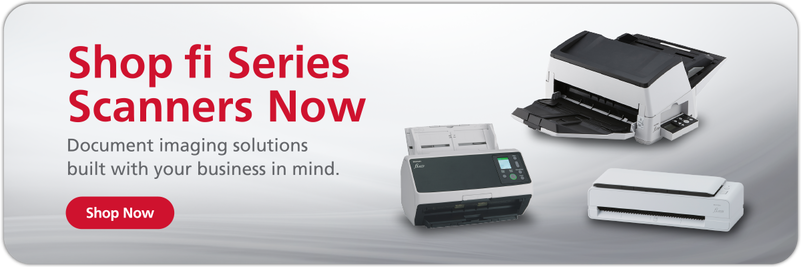Production-scale scanning jobs demand uniquely powerful tools in order for businesses to maintain a healthy bottom line.
The world's skilled knowledge workers have unique needs when it comes to document scanning. Lawyers, doctors, accountants and more all handle massive quantities of information, often in physical form, and that number is on the rise. In fact, one study found that a single attorney could create or receive upwards of 70 documents per day, representing a 50% increase from two years prior.
With so much information passing through the hands of the world's top professionals, many have found it worthwhile to invest in a high volume scanner capable of capturing information from large quantities of documentation at speeds that allow them to keep their offices humming. But knowing how to make the right investment can be challenging. The needs of healthcare professionals can differ from those working in the financial services industry, for example. The best high volume scanner will be a major office investment, and purchasing the wrong model can come at the cost of valuable time. To that end, we've compiled the following guide to help those considering an investment make the right choice for their needs.
Check out our guide, Document Scanners: Everything You Need to Go Digital, for even more expert advice and information.
What is a high volume scanner?
High volume scanners are digital document imaging machines that have been specifically designed to process large amounts of papers, folders, cards, and other types of physical collateral in a minimal amount of time. Unlike general-purpose scanners, these machines are engineered to meet the needs of businesses, government agencies, and other organizations tasked with processing tens-of-thousands of pages per day while simultaneously being held to the highest standards of quality and regulatory compliance.
They are most often employed by professionals working in fields where large quantities of information need to be recorded and kept secure for future reference. Some of the most common industries that invest in these machines include:
- Financial Services
- Government Agencies & Archives
- Healthcare
- Legal Services
- Insurance
- Education
- Commercial Real Estate
- Construction
- Manufacturing
- Transportation
What are the benefits of high volume scanners?
The right high volume scanner can be a force multiplier for any organization dealing in large amounts of physical documentation. They often include features that maximize output to the point that they can make a material impact on a company's bottom line when thoughtfully integrated into a company's workflows. The most common benefits include:
- Time Savings: By far the most valuable feature of high document scanners is their ability to minimize the number of human hours required to digitize large numbers of documents. This can translate into material savings that yield higher returns on contracts and pay dividends in reclaimed human labor hours.
- Error Prevention: The best quantity-optimized scanners are engineered to proactively prevent malfunctions or errors that can require intervention or costly re-scans, including integrated sensors that detect image skew or potential paper jams, triggering mechanical adjustments to stop issues before they happen.
- Flexibility: Often designed for dynamic production environments, the best models are capable of handling a variety of document sizes and thicknesses with minimal calibration or setting changes. Onboard sensors detect the document type in real-time and make adjustments to accommodate them on the fly.
- Accuracy: Because many production scale businesses deal in documentation that contains highly sensitive information like health records, where an illegible character could have dire consequences, many models are designed to ensure the highest quality image capture at scale through a combination of cutting-edge hardware and software.
Because of their potential to deliver value, the best high volume scanners are usually priced above what you'd expect for typical consumer-grade scanners. This reflects the industrial build quality and advanced technology necessary to handle tens of thousands of pages per day. While the upfront cost may be greater, the right model can deliver a dramatic return on investment when properly integrated into a business's operations.
Features to look for in a high volume scanner
Choosing the right model for your needs should be, first and foremost, an exercise in estimated return on investment. These machines typically see a lot of use over their lifetime, and should be considered for their ability to deliver value over time. Here's how to get started:
1. High scanning speeds and expected daily volume
Knowing which model is right for you will depend largely on the number of documents your organization will need to digitize on a regular basis. Review whatever quantitative data you may have related to the number of documents that pass through your operation on any given day. Be sure to account for potential growth scenarios that may see your workflows being placed under the additional strain of larger projects. Knowing the peak work volumes you can expect to handle will help you make a value-based decision on what level of machine to invest in.
Once you’ve got that number, you can seek out scanners that can process pages quickly enough to accelerate your workflow. If you know a high volume scanner is right for your business, you likely want to seek out scan speeds of at least 100+ pages per minute. Additionally, make sure it’s rated to handle at least your estimated daily volume.
Did You Know? The RICOH fi-8950 scans at a blazing 150 double-sided pages per minute from a 750-sheet automatic document feeder (ADF). Click here to learn more.
2. Ease of use
The simpler a device is to use, the more quickly your employees will become productive. They’ll spend less time learning to use the scanner and more time optimizing their use, leading to more efficient work and cost savings.
A clear, backlit, color LCD screen can make it easy for workers to operate the scanner and can reduce the number of actions required to complete scanning a stack of documents.
3. Rigorous compliance
Many industries that handle sensitive information are subject to government regulation to ensure documents are scanned and stored in ways that ensure forward compatibility, accessibility, minimal environmental impact and more. Anyone looking to invest in a high volume scanner should ensure that the models they're considering have been certified by the relevant governing body, standards agency, or working group as being able to meet the unique requirements of their industry.
Some of the most commonly relevant compliance and certification standards include:
- Federal Agencies Digital Guidelines Initiative (FADGI): FADGI is a joint effort between two federal archive working groups seeking to “articulate a common sustainable set of technical guidelines, methods, and practices for digitized and born digital historical, archival and cultural content.” Professionals working at the federal level should be sure to invest in a FADGI-capable machine to ensure compliance going ahead.
- European Accessibility Act (EAA): EAA is a piece of legislation passed in the European Union that articulates accessibility requirements for digital products and services intended to eliminate “barriers to the free movement of certain accessible products and services arising from divergent accessibility requirements in the Member States.”
- United States Trade Agreements Act (TAA): The TAA is what's known as an enabling statute that implements numerous international trade agreements and other commercial initiatives between major geopolitical entities. One of its primary purposes is to promote and facilitate international trade with the United States.
- Electronic Product Environmental Assessment Tool (EPEAT): Developed and managed by the Global Electronics Council, the EPEAT is what's known as a global ecolabel for the IT sector designed to help all those involved in the design, development, manufacture, and purchase of electronics to do so in ways that minimize negative impact on the environment.
Did You Know? The fi-8950 comes with the value-packed PaperStream software suite, powering industry-leading image correction, batch sorting, and enhanced optical character recognition (OCR). Click here to learn more.
Our recommendation: RICOH fi-8950
Those in the market for the best high volume scanner have no shortage of options. We take great pride in having spent the last 50+ years researching, designing, and developing some of the most advanced and powerful electronics in the world, including our professional grade fi and SP series of scanners.
Built to purpose for the most demanding document handling jobs, fi and SP scanners are capable of processing tens of thousands of pages per day at the highest levels of accuracy. Their intuitive integration capabilities with all existing work suites minimize time-to-value for businesses looking to invest in tools that will pay dividends for years to come.
When it comes to high volume scanners, the fi-8950 is the top of the line. You want speed? It scans 150 double-sided pages per minute from a 750-sheet ADF. You want versatile design? Its U-turn and Straight scan feed options keep your options open. Worried about compliance, ease of use, or image clarity? Don't — The fi-8950 is highly secure, boasts a color LCD touchscreen, and uses proprietary Clear Image Capture software to keep scans accurate and readable. Click here to learn more or shop the rest of our production scanner line.









